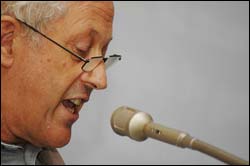Enriching experience at summer school
22 February 2005
Thinking Universe: Emer Prof George Ellis was a popular drawcard at the Summer School 2005 where he delivered a lecture on affective neural Darwinism, or how emotion underlies the intellect.
They came from far and wide (England, France, Namibia and Plettenberg Bay) and they queued for lectures from very early in the morning to ensure they got a seat.
Such is the appeal of the Centre for Extra-Mural Studies' Summer School programme.
Held from January 17-28, Summer School this year attracted some 3 000 bright-eyed and bushy-tailed "students" who signed up for just over 8 000 courses.
Now in its 55th year, the public education programme offers a range of short courses, open to all regardless of educational qualifications. These courses are for non-degree purposes, and do not involve examinations or certification, although written or practical projects and readings may be required.
"Summer School is an enriching intellectual and social experience," explained Medeé Rall, the centre's director. "It is a place where people have access to knowledge and it provides an environment where people can meet each other and discuss ideas."
While one loyal supporter has been attending the programme for 53 years, Rall says the number of younger attendees has also grown.
"We offer a wide spread of courses by eminent speakers from South Africa and abroad and this attracts a diverse audience. Besides addressing topical issues, we also like to try and challenge people.
"From a UCT perspective, Summer School also showcases work done by both young and established academics at the university," she added.
This year, the programme included a day-long excursion as part of the course, titled Water and its Costs in Greater Cape Town.
Accompanied by lecturers from UCT's Freshwater Research Unit, students got the unique opportunity to visit a range of sites that illustrate water issues in Cape Town.
The excursion was designed to complement the course titled Cape Town's Water: how high a price to pay. With distinguished lecturers such as Professors Tony Fairall, George Ellis, Brian Warner, Mark Solms and Anusuya Chinsamy-Turan, it's not surprising that another popular course was The Thinking Universe.
Covering topics such as the formation and distribution of matter in the universe and the development of life on our planet, the course lead to a consideration of the most complex structure known - the human brain - how it is constructed and current theories about how it works.
 This work is licensed under a Creative Commons Attribution-NoDerivatives 4.0 International License.
This work is licensed under a Creative Commons Attribution-NoDerivatives 4.0 International License.
Please view the republishing articles page for more information.










